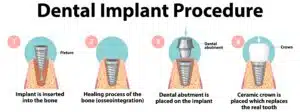How to Prevent Gum Disease After Dental Implant Surgery

How to Prevent Gum Disease After Dental Implant Surgery
Dental technology has come a long way, and implants are a testament to that. Lucky for you, Dr. Kunal Narang at Sunrise Dental is a Dental implants specialist in Redmond with years of experience to help guide you through this procedure. And while gum disease is often an impetus for the need for implants, it may also hinder one’s candidacy for it.
Additionally, there is a risk of developing gum disease when receiving implants, as the gum tissue may have difficulty healing around them. This is why it is important for individuals who are considering dental implants to be aware of gum health and make sure that they practice proper oral hygiene to reduce their risk of gum disease.
Science Behind Dental Implants
In order to understand how you can prevent the development of gum disease with dental implants, it is important to know a bit about the science behind them. A dental implant is essentially a titanium post that is surgically implanted into the jawbone. It has three important components, namely: fixture, abutment, and crown.
The fixture or screw is a post made from titanium or zirconium. It takes the place of the tooth’s root, the part of the tooth that is below the gum line. The fixture will be implanted directly into the gum tissue and jawbone, integrating with both tissues and becoming a permanent part of the mouth.
The abutment is an attachment between the gum tissue and the fixture that helps to support the restorative tooth or teeth. It resembles a cylinder and is what holds the restoration in place.
The crown is a porcelain or ceramic cap that looks exactly like a real tooth. It acts as the replacement tooth, the part of the tooth that is visible when we smile. Aside from a crown, if you’re missing multiple teeth, the fixture can also hold a dental bridge or denture.
INSTALLATION PROCESS
Installing the fixture or titanium post is the first step in the implant process. This requires a local anesthetic and will last anywhere from 30 minutes to two hours. Once the titanium post is in place, the gum tissue will be allowed to heal for a few months. This stage is called osseointegration.
Once osseointegration is complete and the gum tissue has healed, the abutment and crown will be installed. This is generally a quick process that takes only one or two appointments. During this process, the gum tissue is gently separated from the fixture to make room for the abutment and crown.
What is Gum Disease?
Gum disease, also known as periodontal disease, is an inflammatory condition of the gum tissue. Since your gums provide a seal around each tooth, not being able to keep your oral health in check can lead to certain issues. For instance, bacteria left to grow between each tooth can cause gum disease.
The common symptoms of gum disease include:
- Bleeding gums
- Gum recession (swelling, soreness, and tenderness)
- Bad breath
- Dry mouth
- Tooth sensitivity or pain when chewing
- Loose teeth
Untreated gum disease can eventually lead to tooth loss. Worst case scenario, periodontal disease can lead to damage in the gum tissue and jaw bones, as well as other systemic health problems. Since dental implant surgery poses a risk of gum disease, it is important for patients to practice preventive care after their implant procedure.
How to Prevent Gum Disease after Dental Implants
Every dental procedure comes with risks. When it comes to dental implants, one of the risks you need to know is the occurrence of peri-implantitis.
Peri-implantitis is a gum disease that affects the gum tissue surrounding a dental implant. It is caused by plaque and bacteria buildup around the implant area, where the aforementioned symptoms can be present. The worst-case scenario of gum disease is for it to cause the implant to get loose or fail completely.
Below are some of the best practices to prevent gum disease around dental implants:
- Clean the area regularly – Brush your teeth twice a day and floss around the implant daily. Make sure to be gentle when flossing around the gum line.
- Visit your dentist as scheduled – Make sure to keep up with your regular dental visits after your dental implant procedure. Your dentist will be able to check the gum tissue around the implants and make sure that everything is healthy.
- Take prescribed medications – If gum disease does develop around the implant, your dentist may prescribe antibiotics or antimicrobials to help treat it. Be sure to take the medications as directed and finish the entire course of treatment.
- Quit smoking – Smoking can increase the risk of periodontal disease. Quitting smoking or using tobacco products can help prevent periodontal disease and keep your implants healthy.
- Eat a healthy diet – Eating a balanced diet that consists of foods low in sugar and acid can help keep gum disease at bay.
Best Dental Implants Surgeon in Redmond, WA
Another effective safeguard against developing gum disease after dental implant surgery is choosing the right dentist. Sunrise Dental of Redmond offers the best dental implant specialist in the area who can make sure that your implant procedure is successful.
Our team at Sunrise Dental are committed to providing our patients with the highest quality care and making sure that their implant procedure is performed safely. If you have any questions about periodontal disease and dental implants, contact us to schedule an appointment today!
Schedule Your Appointment Now
Schedule your appointment with the Best Dentist in Redmond, WA –
Dr. Kunal Narang and the team at Sunrise Dental of Redmond today.


